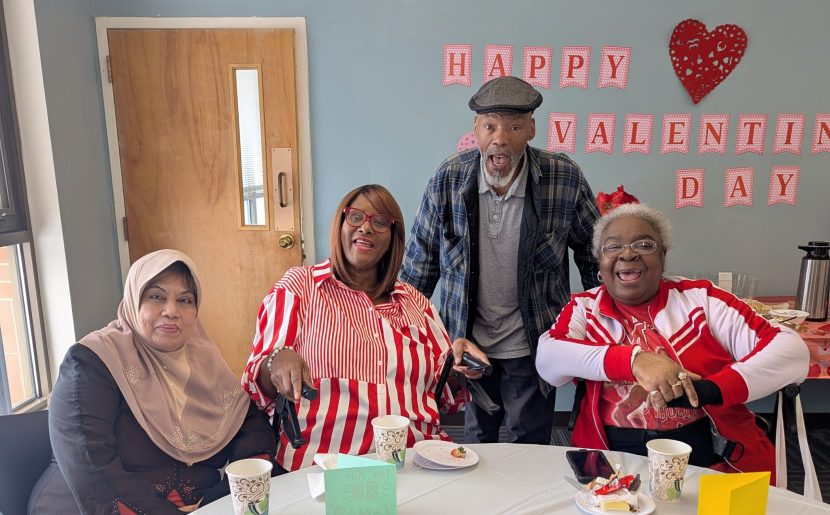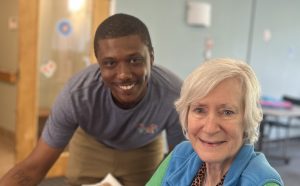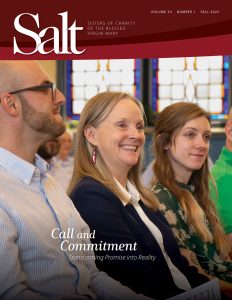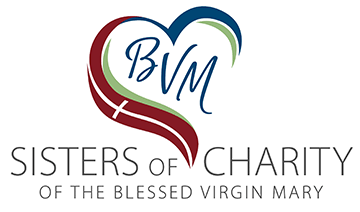More Than a Place to Live: Reimagining Aging in Chicago

Residents celebrate Valentine’s Day.
by Kari Litscher
Across the United States, aging often means slipping into isolation. Living on a limited income in cities like Chicago, many lose community, mobility, and housing stability. But in a few shared spaces, a different story is being written.
Nonprofit H.O.M.E. (Housing Opportunities and Maintenance for the Elderly) is dedicated to helping low-income seniors maintain their independence through affordable housing and support services. A Ministry Partnership Grant from the Sisters of Charity, BVM helps make this work possible.
The collaboration began through DePaul University colleagues Pat Bombard, BVM and Ramya Ramanath, who serves on H.O.M.E.’s Board of Directors.
“I was happy to encourage Ramya to apply for a Ministry Partnership Grant,” Pat shares.
A Mission Rooted in Dignity and Independence
In 1982, H.O.M.E. was founded to address the growing crisis of Chicago’s aging population. In some cases, seniors without financial means or family support were faced with having to leave their homes. H.O.M.E. began with a mission to help economically vulnerable seniors stay in the homes where they had raised their families and built their community network. For more than 40 years, the orginization has been committed to providing personalized care while expanding its reach.
Housing and Services That Feel Like Home
The nonprofit owns and operates three apartment buildings in Chicago (Pat Crowley House, Nathalie Salmon House, and Blackhawk Manor) offering affordable communities where seniors live alongside young adults and families. Shared spaces like gardens and lounge areas create a sense of belonging.
The agency also has programs that help seniors maintain their homes. Contractors and technicians perform repairs, and volunteers prepare homes for Chicago’s harsh winters. A wheelchair-accessible shuttle service provides transportation. If relocation becomes necessary, there is moving assistance.
Responding to Growing Challenges
Development Director Brendan Short explains that most low-income seniors rely primarily on Social Security, which doesn’t provide enough funds for home repairs or household emergencies after taking care of housing, food, and healthcare. H.O.M.E.’s Upkeep and Repair Program assists those homeowners.
“Older homeowners also have a great need to remain in their homes,” Brendan says. “They want to be able to afford stable housing, age in a community with family and friends, and retain their property as an asset for future generations.”
For seniors living in predominantly Black or Latine neighborhoods, discriminatory practices in lending and insurance lead to undervalued homes. These homeowners are often preyed upon by disreputable lenders and contractors, which makes them leery about hiring for repair work.
With funding from the Sisters of Charity, BVM and others, H.O.M.E. expanded their repair program staff. From June 2024 through April 2025, 802 home repairs were completed in 112 homes, compared to 389 repairs in 29 homes the previous year.
Leadership Grounded in Community
Executive Director Gail Schechter’s personal connection to H.O.M.E. runs deep. Before joining the agency, she directed another nonprofit focused on helping seniors housing.
Gail visited the Nathalie Salmon House in 1999 with a local interfaith coalition.
“We saw it as a model of dwelling together,” she shares. “And what Dr. Martin Luther King, Jr. called a ‘Beloved Community’—people of all ages, races, abilities, gender identities, sexual orientations, and religions living, sharing, and enjoying life together.”
When the H.O.M.E. executive director position opened in 2018, Gail applied. The organization’s philosophy of respect for all people inspires her, and she believes that the way people interact—with kindness, patience, and humor—is as important as the homes themselves. themselves.

“How H.O.M.E. delivers its housing and programs sustains a culture of community,” she says.
Looking Ahead
The BVM Ministry Partnership Grant helps provide critical support for H.O.M.E.’s daily services.
“At a personal level, I feel honored by your recognition and endorsement of the great respect and passion with which our staff, Board, and volunteers work with and for seniors,” Gail says.
There are still challenges. Among them is the elimination of the City of Chicago’s Small Accessible Repairs for Seniors Program, which removes an important funding source. A key goal is expanding the Advocacy and Neighborhood Engagement Program, which empowers seniors to advocate for themselves. H.O.M.E also leads Fix Our Homes Illinois, a coalition working to expand home-repair funding for seniors with limited incomes. With dedicated grant funds, they hope to hire their first Advocacy Director later this year.
Pat saw a connection between the BVMs and H.O.M.E. that she knew would bring good results.
“I could see that it fit well,” she says. “Not only with our BVM core values and desire to serve marginalized and underserved populations, but also our long history in Chicago and our current reality as an aging congregation.”
To learn more, visit: homeseniors.org.
This story was featured in:
 Fall Salt 2025: Call and Commitment: Transforming Promise into Reality
Fall Salt 2025: Call and Commitment: Transforming Promise into Reality
If you would like to receive Salt, contact the Office of Development for a complimentary subscription at development@bvmsisters.org or 563-585-2864.
